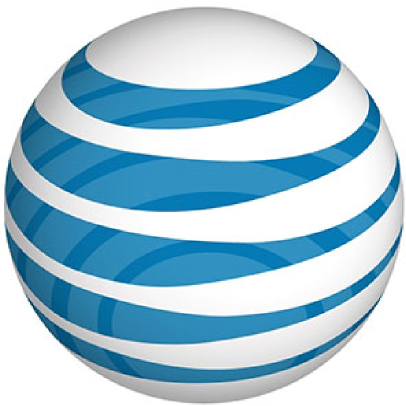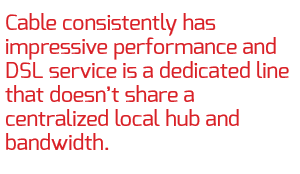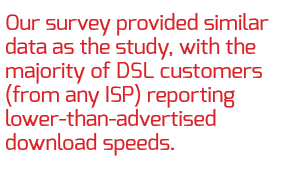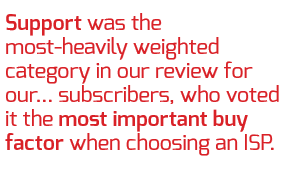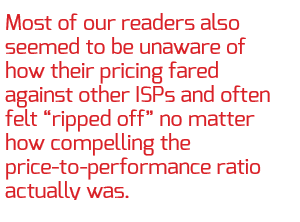ISP Review Roundup & Reader Survey Results
Curious to know what our readers think of their Internet service providers, we conducted a survey asking them to rate pricing, performance, reliability and support on a scale of one to five stars, with one being the least satisfactory and five being the most satisfactory. Over 3100 participants contributed feedback, and we reviewed the four ISPs with the most votes in our reader survey.
AT&T, Time Warner Cable, Comcast and Verizon made our list, with Comcast garnering the most votes (710) and Verizon sliding into the fourth spot with 234 votes. Here are the full survey results for each category.
Pricing
Why you can trust Tom's Hardware
None of the top ISPs breached the three-star barrier for price, though Verizon scored the highest satisfaction rating with 2 3/4 (2.66) stars out of five. It should be noted that, for every other company in the survey, our respondents rated pricing as the second-most important factor when choosing an ISP. Perhaps this is why Verizon edged out its competition with a slightly higher score, despite Time Warner Cable's better price-to-performance ratio.
Here are each company's best offerings:
| Company and Plan | Technology | Speed | Promotional Rate Term | Minimum Contract Term | Stand-alone Price | Price to Performance Ratio |
|---|---|---|---|---|---|---|
| Time Warner Cable's Ultimate 300 | Coaxial Cable Internet | Up to 300 Mb/s | 12 Months | N/A | $65/month | $0.22 per Mb/s |
| Verizon FiOS Quantum Internet(Fiber) | Fiber Optic | Up to 150 Mb/s | 12 Months | 24 Months | $65/month ($75/month for second year) | $0.43 per Mb/s ($0.50 per Mb/s for second year) |
| Comcast's Blast! Internet | Coaxial Cable Internet | Up to 150 Mb/s | N/A | 12 Months | $79/month | $0.52 per Mb/s |
| AT&T's Power 45 | DSL | Up to 45 Mb/s | 12 Months | 12 Months | $65/month | $0.86 per Mb/s |
Most notably, Time Warner Cable offers speeds of up to 300 Mb/s at the same price point as Verizon's FiOS Quantum Internet, which has a rated speed of up to 150 Mb/s. In addition, TWC does not change its price after 12 months, whereas Verizon FiOS increases its price by $10 per month during your second year. However, fiber-optic Internet has the added value of equally fast upload speeds, and that may have been the deciding factor for many of the participants in our survey.
Verizon may have earned the most satisfactory rating for its prices, but its DSL Internet services suffer the worst price-to-performance ratios. Even AT&T beats out Verizon's lowest-tier service. Here's a direct comparison of the worst price-to-performance ratios from the DSL services we've reviewed in our series:
| Company | Internet Plan | Download Speed | Promotional Rate Term | Minimum Contract Term | Stand-alone Price | Price to Performance Ratio |
|---|---|---|---|---|---|---|
| AT&T | Express Internet (DSL) | Up to 1.5 Mb/s | 12 Months | 12 Months | $25/month | $16.66 per Mb/s |
| Verizon | High-Speed Internet (DSL) | Up to 1 Mb/s | 12 Months | 12 Months | $20/month | $20.00 per Mb/s |
AT&T's lowest tier of service beats Verizon's by $3.34 per Mb/s (but costs $5 more per month) and bests its maximum speed by 0.5 Mb/s. Furthermore, Verizon's 1 Mb/s service tier is subject to a $40 equipment rental and $20 one-time installation fee, plus it has a 500MB (that's right, megabyte) monthly data cap. AT&T deserves some recognition for offering slightly better budget DSL pricing (and speed) than Verizon.
At 2 3/4 (2.66) stars out of five, Verizon is the pricing category's winner. Time Warner Cable deserves an honorable mention with its second-place finish of 2 1/4 (2.36) out of five stars, and a price-to-performance ratio that cuts the next-closest competitor's rate in half with double the download speed.
Performance
Surveyed AT&T, Comcast and Time Warner Cable customers rated the performance category least-important when deciding on an ISP, seemingly expecting their coaxial cable Internet and DSL services to provide adequate speed based on the technology. Performance was not a weighted category for many of the surveyed readers who got their Internet from these companies.
However, Verizon participants agreed that performance is the most important factor when choosing an ISP. Perhaps as a result, they rated the company's performance at a series-high four (3.94) out of five stars. Other ISPs are rolling out fiber-optic Internet service, but Verizon is one of the only companies making the technology available on a mainstream basis, offering 14 states a speedy connection with equally fast upload speeds.
That could have been a deciding factor as well, then. Though we didn't measure each ISP's upload speed (some companies wouldn't even guarantee a performance range), it was clear from our readers' comments that Verizon's fiber-optic technology gave it an edge against its similarly speedy competition.
Fiber-optic technology didn't help with Verizon's performance rating when it came to DSL customers, though. The majority of those respondents rated performance at or below two stars. Just like Verizon's DSL-based Internet services as the worst when it comes to price versus performance, the absolute performance of its DSL plans are also among the worst-rated in our survey.
DSL services between 3 and 15 Mb/s are fixed at $30 a month, but actual maximum bandwidth is determined by your location, the strength of the local network and its distance from the central hub. It's pretty much luck of the draw, and most surveyed DSL subscribers seemed pretty unlucky in that respect. This didn't seem to affect the overall performance score much, and the majority of surveyed Verizon customers indicated they were subscribing to FiOS, the company's fiber-optic Internet service.
Data caps were another factor that weighed on our readers in the performance category, particularly for AT&T, which limits each DSL plan to 250GB per month. Although some companies are only implementing these bandwidth restrictions for certain services and regions, our performance winner, Verizon, does not limit data for its fiber-optic FiOS Internet services at all. This might have been the nudge the company needed to pull ahead.
Reliability
Verizon also came out on top for reliability. Its score of 4 1/4 (4.16) stars out of five was the highest of any category from every company in our survey. Readers were generally satisfied with Verizon's fiber-optic services, but once again, DSL subscribers were heavily critical of reliability. However, because DSL subscribers represented a minority of participants, these low scores seemed to have little effect on the overall survey results.
In our survey, we cited a 2014 FCC study titled "Measuring Broadband America." Though slightly dated (the information was gathered in 2013), it gave us a strong base comparison of the types of technologies deployed by each company and a general idea of how reliably these services performed. Here's a round-up of the best scores from each company and service type from the study:
| Company | Technology | Advertised Speed | Actual Sustained Download Speed | Actual Speed/Advertised Speed % |
|---|---|---|---|---|
| AT&T | DSL | Up to 18 Mb/s | 19.25 Mb/s | 107% |
| Comcast | Coaxial Cable | Up to 3 Mb/s | 3.39 Mb/s | 113% |
| Time Warner Cable | Coaxial Cable | Up to 3 Mb/s | 3.03 Mb/s | 101% |
| Verizon | Fiber Optic | Up to 15 Mb/s | 20.67 Mb/s | 138% |
Comparatively, here are each company's worst reliability ratings, according to the study:
| Company | Technology | Advertised Speed | Actual Sustained Download Speed | Actual Speed/Advertised Speed % |
|---|---|---|---|---|
| AT&T | DSL | Up to 1.5 Mb/s | 1.18 Mb/s | 79% |
| Comcast | Coaxial Cable | Up to 20 Mb/s | 21.07 Mb/s | 105% |
| Time Warner Cable | Coaxial Cable | Up to 20 Mb/s | 18.88 Mb/s | 94% |
| Verizon | DSL | Up to 3 Mb/s | 2.41 Mb/s | 80% |
Our survey data agreed with the study's results; a majority of DSL customers (from any ISP) reported lower-than-advertised download speeds. Whereas Verizon had the best bandwidth reliability in our survey (and the FCC report), it once again didn't do as well with its DSL customer base.
Comcast users who participated in our survey generally enjoyed higher-than-advertised bandwidth due to the company's high-speed coaxial cable Internet service. The FCC study showed similar results, with the company's lowest-scoring tier of service providing 105 percent of the advertised speed. The reliability of Time Warner Cable's cable Internet services isn't as high (despite its slightly higher survey rating). In nearly all performance tiers, the ISP achieved 94 to 101 percent of its advertised bandwidth, according to the report. This may have improved since then, because TWC comes in at second place in our survey.
AT&T scored the lowest in this category with a not-too-shabby 3 1/4 (3.17) stars out of five. The competition was close, with Comcast scoring 3 1/4 (3.34) stars and TWC barely nudging into an advantage at 3 1/2 (3.37) stars. But Verizon blew away the competition with a rating of 4 1/4 (4.16) stars out of five.
Overall, each ISP seems to be fairly reliable; all achieved ratings above three stars. Verizon is the only company to breach four stars in this (or any) category, and, according to most of our readers, it deserves the recognition.
Customer Service & Support
Support was the most-heavily weighted category among surveyed AT&T, Comcast and Time Warner Cable subscribers, who voted it the most important factor when choosing an ISP. None of these companies reached three stars in the support category, but Verizon once again blew the other ISPs out of the water with a rating of 3 1/4 (3.20) stars out of five.
Most of our readers were critical of each company's customer service experience, but our surveyed Verizon readers voted support as the least important factor when deciding on an ISP. Perhaps the lesser importance of this category is what gave Verizon the lead, as it was the only ISP to score above three stars.
Another theory is that Verizon may actually provide above-average support for its Internet services. It's hard to weed through a sea of negative comments that detail everyone's worst possible experience because the fact is that we've all had a service disruption at one point or another, waited on hold and felt somehow wronged when the most convenient tool in the house (the Internet) went down unexpectedly.
These things happen, and no ISP is immune. However, the Verizon subscribers in our survey didn't seem to hold customer service and support to as high a standard as the other companies, rating the fiber-optic Internet service above the rest. Once again, Verizon DSL customers were the primary source of unsatisfactory ratings, but because they represented a minority, they did not prevent the company from attaining the highest support score in our survey.
Overall Score
Our readers picked a clear winner, and the overall scores shouldn't surprise anyone. Verizon was the only company to earn higher than three stars, with other companies scoring middle-of-the-road ratings between 2 1/4 stars (AT&T) and 2 3/4 stars (Comcast and Time Warner Cable). Verizon topped the competition with 3 1/2 (3.47) stars out of five, earning it a coveted Tom's Hardware's Readers' Choice Award.
AT&T, Comcast and Time Warner Cable struggled to please their customers in the right categories. The most important factors were generally the lowest-scoring ones, which has a huge impact on the overall rating. Our surveyed Verizon customers appeared to have a different set of priorities compared to users of other ISPs, and rated the most important categories favorably.
Fiber-optic technology fared better than other service types in pricing, but Verizon still didn't break the three-star barrier with its series-high rating. Most of our readers also seemed to be unaware of how Verizon's pricing compared to that of other ISPs, and often felt "ripped off" no matter how compelling the price-to-performance ratio actually was.
DSL technology, particularly AT&T's, scored the lowest in pricing and performance. However, AT&T hung tough with the other ISPs and service types in the reliability category. AT&T even looked like it might win in the support category until Verizon came along and decimated the field. Surveyed Verizon DSL customers had plenty of negative feedback to share, but because they represented a minority of subscribers, those low ratings had a minimal effect on Verizon's overall scores.
AT&T, Comcast and Time Warner Cable certainly have their own merits as well. AT&T offers above-average support and competitive pricing; Comcast had the most votes in our survey and gave most of its customer's higher-than-advertised access speeds; and TWC has the best price-to-performance ratio, offering up to 300 Mb/s at $0.22 per Mb/s.
Conclusion
We're glad we got to review the top four ISPs in the country, and our readers were instrumental in providing the data used to critique these companies in an unbiased fashion. Our community is already asking for more results for the other, less represented ISPs, and we may take a look at them in the near future. We'd like to thank everyone who voted in Tom's Hardware's ISP Review Survey, and for all of the useful feedback.
The dust has cleared in our big-four ISP battle, and Verizon claims the throne in every category. If that doesn't deserve a Tom's Hardware Reader Recommended ward, I don't know what does. The clean sweep makes a strong case that Verizon's fiber-optic Internet service offers some of the best pricing, performance, reliability and support available.
Verizon FiOS may reign supreme for now, but with competition rising in fiber-optic Internet services from the likes of Google Fiber, AT&T and Comcast, it may not be the biggest dog in the yard this time next year.
MORE: AT&T ISP ReviewMORE: Comcast ISP ReviewMORE: Time Warner ISP ReviewMORE: Verizon ISP Review
Derek Forrest is an Associate Contributing Writer for Tom's Hardware and Tom's IT Pro.
Follow Derek Forrest on Twitter. Follow Tom's Hardware on Twitter, Facebook and Google+.
Get Tom's Hardware's best news and in-depth reviews, straight to your inbox.
Derek Forrest was a contributing freelance writer for Tom's Hardware. He covered hardware news and reviews, focusing on gaming desktops and laptops.
-
envy14tpe Having grown up and lived in the US most of my life, and now (temporarily) in Asia...American carriers are terrible and overpriced and capped for no reason. :(Reply -
theyeti87 I'm happy I live in an area where I have a lesser-known cable ISP. I'm on the border of Comcast-land and Mediacom-land, on the Meidacom side. 50Mbps up / 5Mbps down ~$80/month. 350GB monthly cap, 25-33ms latency to my regular game servers. Still overpriced, but better than Comcast.Reply -
joonee88 I'm paying $25 a month for a 500mbps service here in South Korea with 100GB per day cap. After that, it drops to 100mbps. Internet prices are outrageous in the US.Reply -
Math Geek ReplyI'm paying $25 a month for a 500mbps service here in South Korea with 100GB per day cap. After that, it drops to 100mbps. Internet prices are outrageous in the US.
it "drops to 100 mb". i'd be happy to have this "disabled" speed for that money!! -
envy14tpe Reply17574622 said:I'm paying $25 a month for a 500mbps service here in South Korea with 100GB per day cap. After that, it drops to 100mbps. Internet prices are outrageous in the US.
Korea has the fastest internet in the world. Here, in Taiwan, I pay $30usd for 60down/20up with 5 ping; and never had cap issues. -
Hund0b1 I pay 30 USD for 100/10 Mbit. Fiber with no stupid bandwidt cap here in Sweden. 1000/100 Mbit cost 67 USD.Reply
I'm glad I don't live in the states. :) -
sygreenblum Just had to deal with Comcast this week. Took off work to meet the install guy. He didn't show and when I called Comcast justifiably irate, they told me to hold while they set up another appointment. 15 minutes later and still on hold I hung up. I don't watch much TV, if they really want a customer they will call me back. If not screw them.Reply -
ComputerSecurityGuy Yeah, US providers are awful. I am working on getting our neighborhood together to run fiber out from a municipal fiberloop, but if everyone isn't on board it is just too expensive. Cost per month is great, though.Reply -
dstarr3 It's pretty outrageous how terrible America's internet is. Snail's pace for a small fortune per month, with caps that are only in place to prohibit you from depending on Netflix for all your TV and movies.Reply -
Achoo22 The sidebar mistakenly suggests that DSL doesn't feature a local hub that can present a bandwidth bottleneck. This is a fallacy and one that has persisted since the early days of DSL marketing. Please, get your facts straight. The first hop, at a CO or DSLAM is an aggregation point that absolutely suffers from bandwidth contention. And because of the short last-mile of DSL, it is always local. As a DSL user that suffers every time my neighbors start their evening Netflix binging, it irks to see a tech. site misreport the facts.Reply
